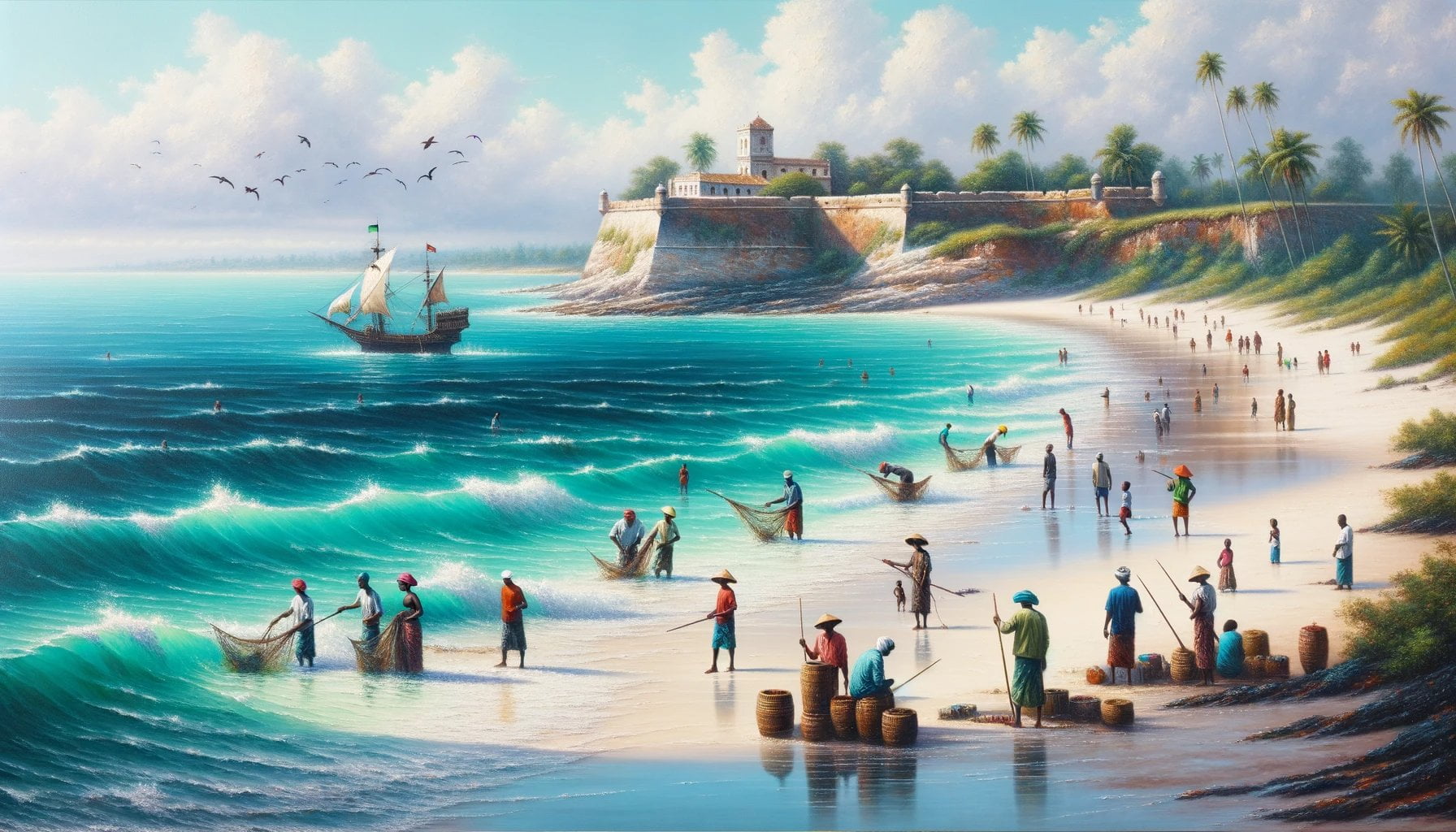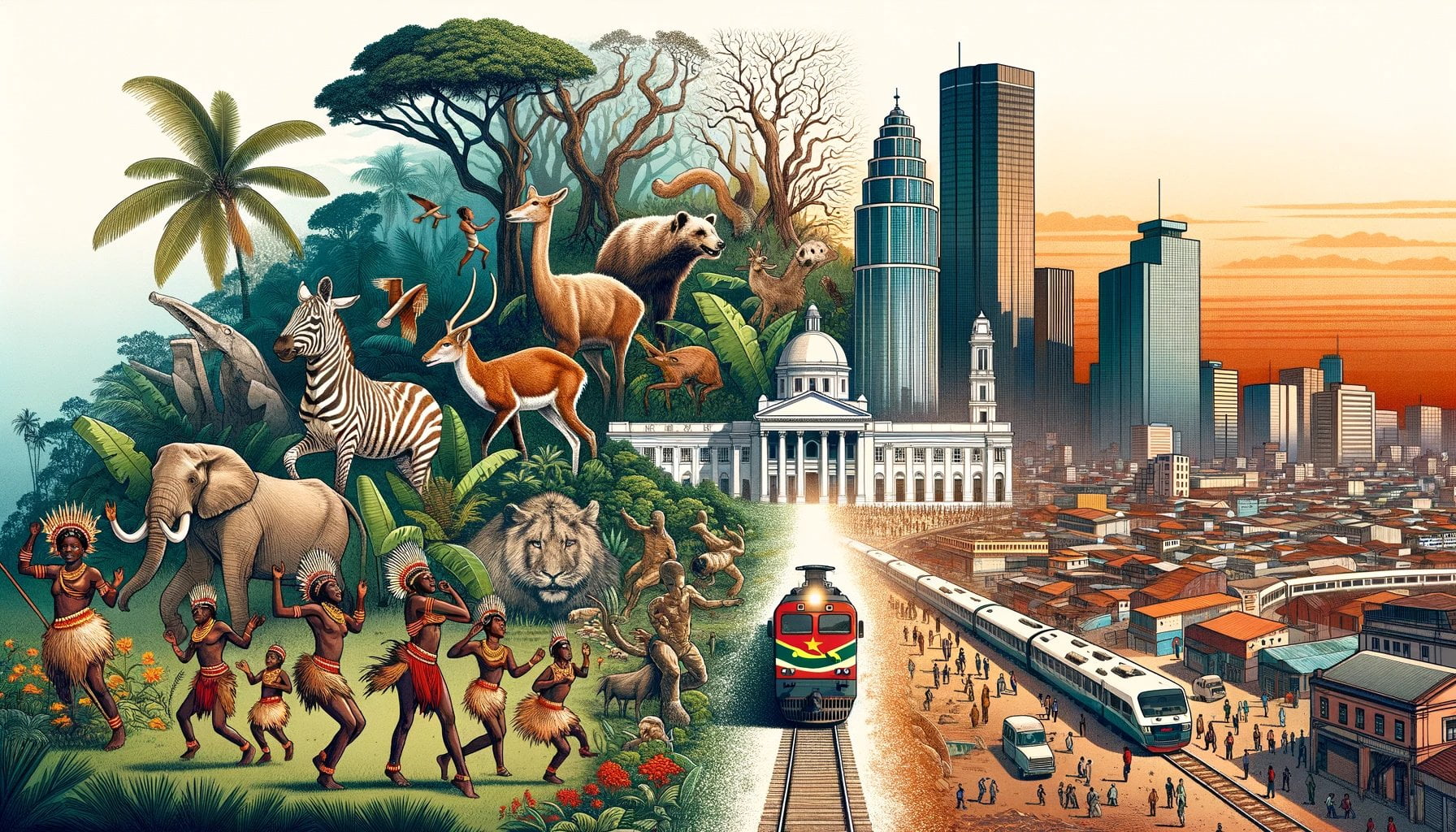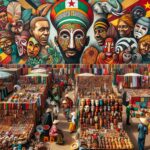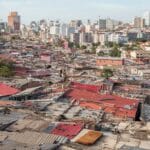Unearthing Angola’s Rich History: Explore the Intricacies of Colonialism, Struggles for Independence, and Post-Colonial Transitions. Delve into a captivating journey through Angola’s past, as we uncover the hidden depths of its history. From the intricate web of colonialism to the tireless struggle for independence, and the challenges faced during the post-colonial era, Angola’s story is a fascinating tapestry of events and cultural developments. Join us as we peel back the layers and shed light on the often overlooked aspects of Angola’s historical narrative, bringing its rich heritage to life for a wide audience.
Key Takeaways:
- Angola’s history dates back to ancient times, with the region being inhabited by San hunter-gatherer societies and later encountering Bantu groups.
- Portuguese colonists arrived in Angola in the 15th century and established a settlement at Luanda in the 16th century, leading to the foundation of the Portuguese colony of Angola.
- The Kingdom of Kongo emerged in Angola in the 13th century and established close relations with the Portuguese, who introduced firearms, technology, and Christianity to the region.
- The Kingdom of Ndongo, ruled by the ngolas, was a significant state in Angola, and Queen Jinga formed a coalition that forced the Portuguese to retreat.
- Angola experienced occupation and reclamation by the Dutch and Portuguese forces from Brazil in the 17th century.
- The enslavement of Angolans played a crucial role in the development of the Portuguese colony of Brazil.
- Angola gained independence from Portugal in 1975, but it was followed by a long civil war that lasted until 2002.
Angola History

Welcome to a fascinating journey through the history of Angola, a country with a rich and intricate past. In this article, we will uncover the complexities of colonialism, struggles for independence, and the transitions that have shaped Angola’s history.
Early Settlements and Colonization
Angola’s history dates back to ancient times when San hunter-gatherer societies inhabited the region. As time went on, Bantu groups migrated from the north and encountered the San people, leading to cultural interactions and exchanges.
The Portuguese arrived in the 15th century, establishing trade and ultimately founding a settlement at Luanda in the 16th century. With the arrival of Paulo Dias de Novais in 1575, the Portuguese colony of Angola officially took shape.
Kingdoms and Influences
In the 13th century, the Kingdom of Kongo emerged as a significant political entity in the area. Close relations were established between the Portuguese and the Kingdom of Kongo when Portuguese caravels arrived in the Congo in 1482. This brought technological advances, firearms, and Christianity to the region.
While the Portuguese colony of Angola gained city status in 1605 and made strides in converting the local population to Christianity, the Kingdom of Ndongo, ruled by the ngolas, remained an influential state in the region. Queen Jinga of Ndongo even formed a grand coalition that forced the Portuguese to retreat at one point.
Colonial Struggles and Slave Trade
The Dutch occupation of Luanda in 1641 served as a temporary setback for the Portuguese, but they were able to retake the city in 1648 with forces from Brazil. This period marked the height of the transatlantic slave trade, with slaves from Angola playing a vital role in the development of the Portuguese colony of Brazil.
Road to Independence
Angola’s path to independence from Portugal was filled with turbulence. In 1975, Angola finally gained its independence, but it triggered a lengthy and devastating civil war that lasted until 2002. This internal conflict had profound effects on the country’s political, social, and economic landscape.
The Significance and Legacy
Understanding Angola’s history is crucial to comprehending its present-day reality. The experiences of colonization, struggles for independence, and post-colonial transitions have shaped Angola into a complex and diverse nation. Unearthing the intricacies of its past allows us to appreciate the resilience and strength of its people.
By exploring Angola’s history, we can gain valuable insights into the challenges and triumphs that have shaped this African nation. It is a story of resilience, cultural transformations, and the pursuit of independence.
The history of Angola is a tapestry woven with various threads. Each thread represents a chapter that adds depth and nuance to the overall narrative. From the early settlements and colonial influences to the struggles for independence and post-colonial transitions, Angola’s history enthralls us with its twists and turns.
As we delve further into the story of Angola, let us remember that the true significance lies not only in understanding the past but also in recognizing how it continues to shape the present and future of this remarkable nation.
If you’re curious about the fascinating facts about Angola, click here to discover more!
Embark on an unforgettable journey through the captivating tourism in Angola. Click here to explore the hidden treasures!
Delve into the rich and vibrant Angola culture by clicking here. Get ready to be amazed!
Discover the famous places in Angola that will leave you in awe. Click here to embark on a virtual tour!
Experience the mouthwatering flavors of Angola cuisine by clicking here. Get ready to tantalize your taste buds!
Angolan Independence Struggle and Anti-Colonial Movements
The Ideological and Political Preconditions for Angola’s Struggle for Independence
The struggle for Angola’s independence in the early 1960s was not just a fight against Portuguese colonial rule; it was also a part of a global battle against imperialism, racism, and Western hegemony. Factors such as the Cold War, Portugal’s position, the reactions of the people, and the challenges faced all shaped and influenced Angola’s fight for independence.
The Role of Angola in the Global Anti-Colonial Movement
Angola’s fight for independence was positioned within the larger context of the global battle against imperialism, racism, and Western hegemony. The national liberation movements in Angola actively raised the issue of independence in international forums, garnering transnational support networks. This internationalization of their cause helped to shed light on the fight against colonization and gained solidarity from other nations.
The Impact of the Cold War on Angola
The Cold War had a significant influence on Angola’s struggle for independence. It became a political theater where competing powers sought to gain influence. The rivalry between the United States and the Soviet Union played out in Angola, with both superpowers supporting different factions in the conflict. This external involvement complicated the struggle for independence and prolonged the civil war even after independence was achieved.
Portugal’s Role in Angola’s Independence Struggle
Portugal, as the colonial power, played a central role in the struggle for Angola’s independence. The people of Angola fought their colonizers on multiple fronts, leading to a prolonged civil war that continued even after independence was achieved. Portugal’s reluctance to give up its colonial hold and the resistance faced by the liberation movements further intensified the struggle for independence.
Challenges Faced by Angola’s Liberation Movements
One of the main challenges faced by Angola’s liberation movements was the reluctance of dominant groups to share power within a multi-ethnic society. Three major rebel movements, MPLA, FNLA, and UNITA, emerged with competing nationalist ideologies, leading to internal conflicts and power struggles. These divisions within the liberation movements hindered the fight for independence and had lasting impacts on post-independence politics.
Reactions of the Angolan People
The Angolan people played an active role in the fight for independence, supporting different liberation movements based on regional and ethnic affiliations. The struggle for independence led to widespread violence and atrocities committed by all sides involved in the conflict. The determination and resilience shown by the Angolan people in the face of oppression and colonization helped to shape the course of the independence struggle.
Key Takeaways:
- Angola’s fight for independence was part of a global movement against imperialism, racism, and Western hegemony.
- The Cold War rivalry between the United States and the Soviet Union influenced Angola’s struggle for independence.
- Portugal’s reluctance to give up its colonial hold led to a prolonged civil war even after independence was achieved.
- Internal divisions within the liberation movements posed challenges to the fight for independence.
- The Angolan people played an active role in the struggle for independence, but the conflict resulted in widespread violence and atrocities.
Sources:
1. Sobers, C. (2019). Independence, Intervention, and Internationalism: Angola and the Cold War. Journal of Cold War Studies, 21(1), 97-119.
2. South African History Online. The Angolan Civil War (1975-2002): A Brief History.
Post-independence challenges and civil war
The post-independence era in Angola was marked by numerous challenges and a devastating civil war that lasted for almost three decades. In this article, we will delve into the complexities of Angola’s history, focusing specifically on the difficulties faced by the country after gaining independence from Portugal and the impact of the prolonged civil war.
A Divided Nation
After Angola achieved independence from Portugal in 1975, the country found itself at a critical crossroads. Three liberation movements, namely the FNLA, MPLA, and UNITA, vied for power and influence, each representing different ethnic groups and political ideologies. Unfortunately, these movements were unable to form a united front, leading to tensions and conflicts.
MPLA’s Declaration of Government
The MPLA (Popular Movement for the Liberation of Angola) declared itself the government of Angola, which triggered clashes with other groups seeking power. These conflicts, exacerbated by ethnic tensions, set the stage for a prolonged civil war.
Escalation and External Influences
The civil war in Angola was further fueled by external factors. Portuguese guerrillas, known as the “retornados,” launched attacks in Angola, escalating the armed conflict. Additionally, the Cold War era saw the United States and the Soviet Union supporting different factions in Angola, turning the civil war into a proxy battle.
Lengthy Conflict and Devastation
Angola’s civil war began in 1975 and lasted until 2002, making it one of the longest and deadliest conflicts in African history. The war resulted in immense suffering, displacement, and loss of life for the Angolan people. It had a profound impact on the country’s infrastructure, economy, and social fabric.
The Peace Agreement and Its Aftermath
In 2002, a peace agreement was finally reached, bringing an end to the civil war. However, despite the cessation of hostilities, Angola continued to face significant challenges in the post-conflict period. Rebuilding the nation and healing the wounds of war proved to be a complex and arduous task.
Key Takeaways:
- The post-independence era in Angola was marred by a divisive civil war that lasted from 1975 to 2002.
- The conflict stemmed from the inability of different liberation movements to form a united front and the declaration of government by the MPLA.
- Ethnic tensions and external influences, such as Portuguese guerrilla attacks and Cold War dynamics, exacerbated the civil war.
- Angola’s civil war resulted in immense suffering, displacement, and loss of life, both directly and indirectly.
- Despite the peace agreement in 2002, the country still faced significant challenges in the post-conflict period.
Sources:
– Angola – Civil War, Independence, Oil | Britannica
– The Angolan Civil War (1975-2002): A Brief History | South African History Online
Modern Angola: Economic growth and cultural development
Key Takeaways:
– Angola’s economic fortunes have been tied to global oil demand, resulting in volatility in growth and high levels of poverty and inequality.
– Despite the challenges, Angola has experienced economic development and become one of the fastest growing economies in the world.
– Luanda, the capital of Angola, showcases signs of economic prosperity with booming businesses and luxury infrastructure.
– Economic diversification and development potential are important for Angola’s future growth and resilience against climate change impacts.
– Angola’s history includes its role in the Atlantic slave trade, colonization, and attempts to stimulate the economy.
– The country has made progress toward multiparty democracy and a market economy, but challenges in governance and corruption persist.
– Recent macroeconomic and financial developments in Angola show improvements in GDP growth and income per capita.
– Angola’s economic outlook includes the need for diversification into new products to facilitate sustained economic growth and reduce inequality.
Angola’s modern history is a tapestry woven with threads of economic growth and cultural development. As the economic fortunes of the nation have been intertwined with global oil demand, Angola has experienced a rollercoaster ride of growth and challenges. The country’s reliance on oil has led to volatile economic conditions, marked by high levels of poverty and inequality. However, against all odds, Angola has emerged as one of the fastest growing economies in the world, with a projected GDP growth of nearly 16%.
One vibrant indicator of Angola’s economic prosperity can be witnessed in Luanda, the capital city. Business is booming, luxury vehicles grace the streets, and opulent hotels stand as testaments to the country’s growing wealth. These visible signs of progress hint at Angola’s potential for economic diversification and development, which are crucial for sustaining growth and building resilience in the face of climate change impacts.
To truly understand the economic landscape of modern Angola, it is essential to delve into its rich historical roots. Throughout history, Angola has played a significant role in the fabric of the transatlantic slave trade and has endured colonization and exploitation. The country served as a major hub for the slave trade, with countless lives and cultures torn apart. European powers invested in Angola’s economy, using it as a source of raw materials and cheap labor.
Since gaining independence from Portugal in 1975, Angola has made strides towards multiparty democracy and a market economy. However, challenges persist in terms of governance and corruption, hindering the country’s full potential. Yet, recent macroeconomic and financial developments in Angola suggest positive changes. Real GDP growth reached 3.0% in 2022, signaling progress, and income per capita is also on the rise.
For Angola to sustain its economic growth, it must diversify into new products of increasing complexity. This transformation would allow the country to reduce its dependence on oil and stimulate the economy in a more inclusive manner. At present, Angola faces significant income inequality, with a relatively high Gini coefficient of 0.51. By expanding its economic horizons and embracing new industries, Angola can drive sustained growth and work towards a fairer distribution of wealth.
To explore the intricate history of Angola’s economic growth and cultural development, it is crucial to consult reputable sources. The World Bank provides comprehensive information, research, and data on Angola’s economy, giving valuable insights into the country’s progress. The Council on Foreign Relations also offers detailed perspectives on Angola’s political and economic development, including a focus on its oil industry and its relationship with China.
In summary, Angola’s journey towards modern economic growth and cultural development has been eventful, marked by both progress and challenges. Unearthing the nuances of its history and understanding the complexities of the present-day reality are vital for appreciating the country’s resilience and potential. Through economic diversification and a concerted effort to address governance issues, Angola can forge a path towards sustained growth, reduced inequality, and a brighter future for its people.
Sources:
1. World Bank: Angola Overview
2. Council on Foreign Relations: Angola’s Political and Economic Development

FAQ
Q1: What is the significance of Angola’s struggle for independence?
A1: Angola’s struggle for independence was not only a fight against Portuguese colonial rule but also a part of the global battle against imperialism, racism, and Western hegemony. It raised awareness about the fight against these oppressive systems and garnered transnational support networks.
Q2: How did the Cold War influence Angola’s struggle for independence?
A2: The Cold War had a significant impact on Angola’s struggle for independence. It served as a political theater where competing powers, such as the United States and the Soviet Union, sought to gain influence. Both superpowers supported different factions in the conflict, intensifying the struggle.
Q3: What role did Portugal play in Angola’s struggle for independence?
A3: Portugal, as the colonial power, played a central role in Angola’s struggle for independence. The people of Angola fought against their colonizers on multiple fronts, leading to a prolonged civil war that continued even after independence was achieved.
Q4: What were the challenges faced by Angola’s liberation movements?
A4: One of the main challenges faced by Angola’s liberation movements was the reluctance of dominant groups to share power within a multi-ethnic society. Additionally, internal conflicts and power struggles arose among the three major rebel movements, MPLA, FNLA, and UNITA, due to competing nationalist ideologies.
Q5: How did the Angolan people react to the struggle for independence?
A5: The Angolan people played an active role in the fight for independence, supporting different liberation movements based on regional and ethnic affiliations. However, the struggle led to widespread violence and atrocities committed by all sides involved in the conflict.









